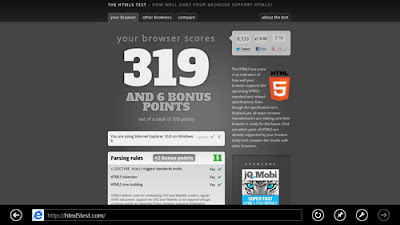A closer look at Windows 8‘s
browser: Internet Explorer 10
 |
| Internet Explorer 10 |
Windows
8's browser, Internet Explorer 10, leads a double life. You can run it in
Metro, you can run it in the traditional Windows desktop view. Underneath,
however, both use the same rendering engine. This engine has been considerably
improved, in both speed and support for new Web technologies such as HTML5 and
CSS3. Maybe even more significantly, IE10 isn't just the browser for Windows 8,
it actually becomes the underlying engine that powers Metro style applications
that use HTML5 and JavaScript. When you realize that, it becomes clear that
Internet Explorer 10 is a crucial piece of the Windows 8 puzzle.
At
the moment, Microsoft is only making the preview version of IE10 available for
Windows 8 Release Preview, but, at release, it will be available for Windows 7,
Windows 8, Windows Server 2008 R2, and Windows Server 2012. To try out Windows
8 and IE10, head to the Windows 8 Release Preview download page.
Windows
8One gauge of HTML5 readiness is the HTML5Test.com site, which reports a score
based on how many HTML5 features it supports, along with bonus points for
non-standard-specific extras like video codecs. Out of a possible 500, IE9
earns a score of 138, compared with 414 for Google Chrome. IE10 changes this
picture considerably, with a score of 319 and 6 bonus points.
 |
| Browser |
Though
it's often stated that Chrome and Firefox are ahead of IE in HTML5 support,
some of the test drive demos show that those browsers haven't yet implemented
every capability. One example is Touch Events, which lets a webpage respond to
gestures.
 |
| Performance Comparison |
however,
there's an app interface you use to browse the Web, and the main changes here
are in the Metro version of IE10. Let's look at how this clean, minimalist
design, full-screen, touch-friendly new interface handles your daily browsing
needs.
No comments:
Post a Comment